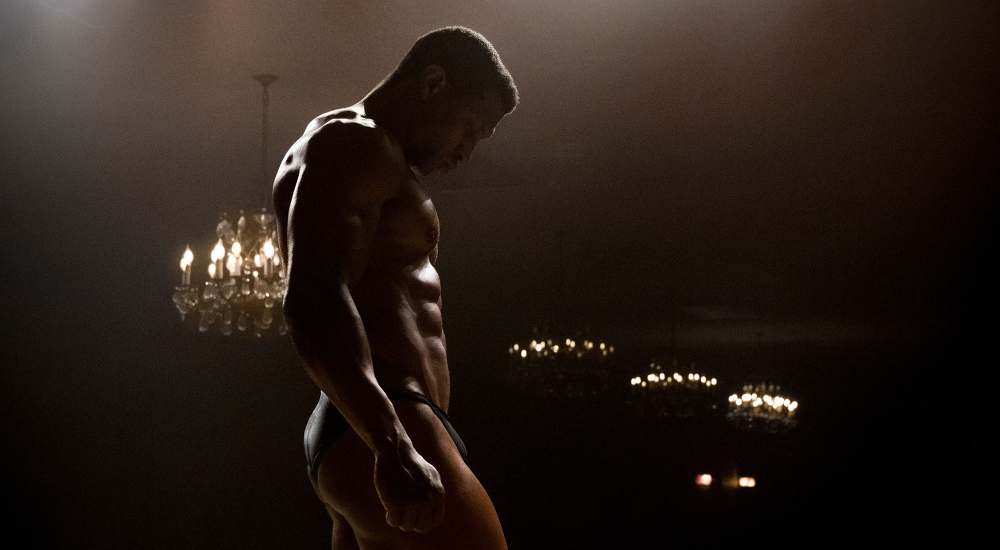"Bodybuilders can't have scars."
No matter how you slice it, Elijah Bynum's Magazine Dreams is an independent movie curated by a brilliant, courageous mind, willing to push boundaries and explore life outside the proverbial box. But at its core, the film's themes are every bit commercial as Bynum builds an in-depth character study that explores the effects of obsession, trauma, loneliness, and suppressed rage, to name a few.
At any given moment, the story's bottom can crater, leaving us in a heap of despair as we witness the unraveling of our antihero. We sit in a state of discomfort, waiting for the needle to drop and for the perceived world of Killian Maddox, a Black amateur bodybuilder played by Jonathan Majors, to change forever. Bynum fearlessly digs into Maddox's universe, giving us the many sides of the man we long to root for, countering his heart and compassion with his hardships and sacrifices.
The film begins at a time when Maddox is still nurturing some version of hope. He has a magnificent physique that he constantly works to perfect. As the film's title would imply, he dreams of gracing the cover of a fitness magazine like his idol, Brad Vanderhorn (Michael O'Hearn). At this time, we, too, believe that maybe he'll reach those high-arching goals. He works out constantly in the gym, shoots up steroids that are making him sick, and writes letters to Vanderhorn, a former Mr. Olympia, detailing his progress. When he speaks, which isn't often, he does so in a soft, gentle tone that has us rooting for him.
But Maddox isn't always the kind, gentle man we first meet. He has an absorbent capacity for violence, intense, rage-filled violence. He has been locked up for an outburst and is currently seeing a court-mandated counselor. His ability to connect with others leaves much to be desired as his delivery can unexpectedly switch, a somewhat Jekyll-Hyde variant.
When Killian, who bags groceries at a local supermarket, flirts with a cashier during one of his off-shift shopping runs, he is charming and vulnerable. His insecurities bring a softness to his hard external shell, highlighting a potential path to his emotions. It is at this moment that our investment in his happiness becomes complete. Their first date takes place at Killian's favorite steak restaurant. Though things start great, Killian struggles to contain his ambition, ordering enough food for a family of six as he intensely preaches about the commitment required to compete at the highest level of his chosen sport. The rant is fierce and excessive, bringing out fear in his date. Within minutes he is sitting at the table alone, his understanding of the situation not full, his loneliness on display as he digresses and emotionally eats against his diet, his main competition a mere ten days away.
These moments pull at your heartstrings as you learn more about Killian's upbringing, the events leading to his obsessive nature, violent outburst, and emotional struggles to connect. Majors gives one of the most complete and striking performances I've witnessed in a long time. Outside of the visual alternations he made to his body, the concentration on the mental aspect of our protagonist is what makes the delivery so impactful.
During the third act, when lasting violence appears the only way out, you'll likely shift in your chair in constant uneasiness. That's expected. At one moment, gun in hand, Killian breaks into a man's house, sipping a glass of water as he waits for him to return. The middle-aged man, shaking with fear, is forced to strip, Patti Smith's "Because the Night" blaring from the speaker system. The man's crime: years ago, while judging a bodybuilding contest, he felt Killian's deltoids were too small. The fact that this one comment, made by an overweight man with an unflattering body, has pained Killian for so long is a vital sign of his obsession and insecurities. But more so, it illuminates a power distortion in our society that disproportionately affects minorities and persons of color.
While Bynum deserves credit for crafting such a complex and pure character, Majors' interpretation drives the narrative forward. Magazine Dreams highlights the ongoing mental health issues resulting from childhood trauma and insufficient post-traumatic support, helping to generate uncomfortable conversations that need to happen. Though Killian occasionally goes off, Majors keeps the film (and character) grounded, focusing on the larger issues that drive the unexpected explosions.
I found myself hanging on every scene, nervous for the journey, hopeful for a conclusion that would ease my mind. Though I wish Killian's story were unique, it is likely much more common than I realize. I always struggle to explain why some movies can be significant works of art but not "fun" or "enjoyable" to watch. Magazine Dreams fits that to near perfection as social commentary is heavily present, its lasting impact undoubtedly worth the disquiet.

